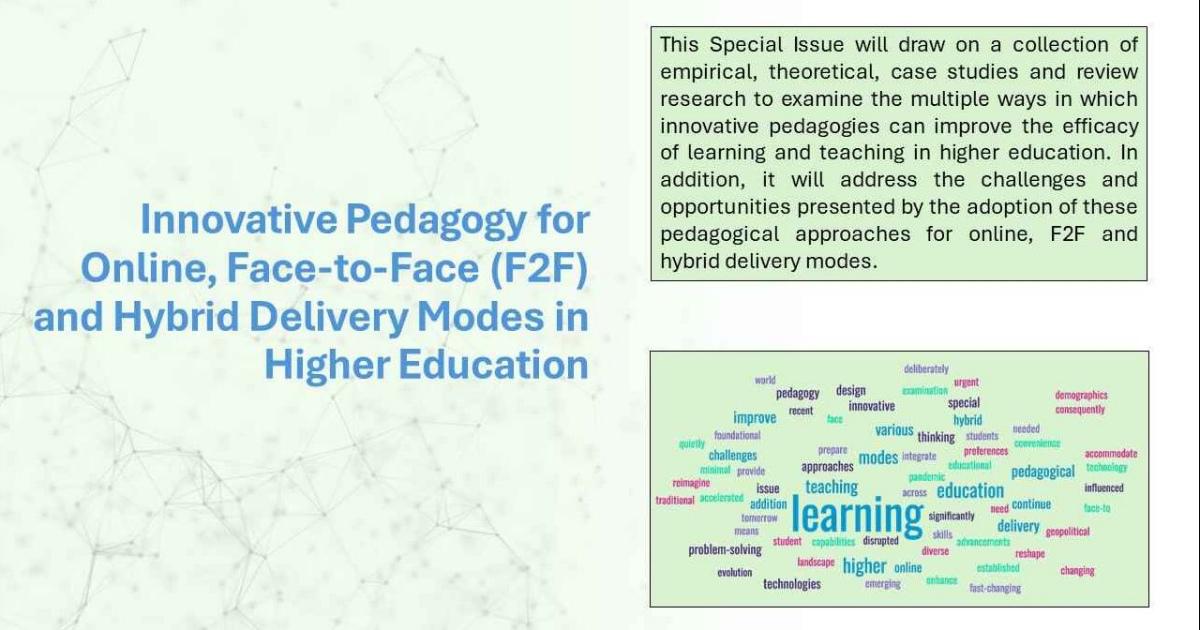Innovative Pedagogy for Online, Face-to-Face (F2F) and Hybrid Delivery Modes in Higher Education
A special issue of Education Sciences (ISSN 2227-7102). This special issue belongs to the section "Higher Education".
Deadline for manuscript submissions: closed (30 October 2025) | Viewed by 16797

Special Issue Editor
Interests: spatial decision support systems; collaborative GIS; quantitative and statistical geography; environmental decision-making; teaching and learning in higher education
Special Issues, Collections and Topics in MDPI journals
Special Issue Information
Dear Colleagues,
The evolution of higher education has been significantly disrupted and influenced by the recent 2020 pandemic. Various delivery modes such as online, face-to-face (F2F) and hybrid learning have quietly established themselves as convenient with minimal examination of their capabilities to enhance learning and teaching. In addition, accelerated advancements in educational technology, as well as changing student demographics and geopolitical challenges continue to reshape the higher education landscape. Consequently, there is an urgent need to reimagine traditional pedagogy to accommodate diverse learning preferences, integrate emerging technologies and prepare students with the skills needed for the fast-changing world of tomorrow. Innovative pedagogical approaches across various delivery modes provide a foundational means to deliberately design the higher education transformation process where learning is at the forefront. By grounding pedagogical innovations in evidence-based principles of how learning occurs, this Special Issue contributes to enhancing the quality and relevance of higher education, even as changes continue to occur.
The Special Issue will draw on a collection of empirical, theoretical, case study and review research to examine the multiple ways in which innovative pedagogies can improve the efficacy of learning and teaching in higher education. In addition, it will address the affordances created from the adoption of these pedagogical approaches for online, F2F and hybrid delivery modes. Contributions are welcome in, but are not restricted to, the following areas:
- Problem-based learning for critical thinking and problem-solving;
- Inquiry-based learning for scientific thinking and problem-solving;
- Flipped classrooms to improve access to learning;
- Collaborative and cooperative learning;
- Service learning and field trips for experiential learning;
- Game-based learning to improve engagement and motivation;
- Artificial intelligence in teaching and learning;
- Management of plagiarism and academic integrity;
- Learning analytics for pedagogy improvements;
- Evaluations and assessments for improved learning and teaching;
- Instructional design and technologies for personalized learning;
- Equity, inclusion and accessibility of various learning environments.
Thank you for contributing to this important research area through your manuscript submission.
Dr. Shivanand Balram
Guest Editor
Manuscript Submission Information
Manuscripts should be submitted online at www.mdpi.com by registering and logging in to this website. Once you are registered, click here to go to the submission form. Manuscripts can be submitted until the deadline. All submissions that pass pre-check are peer-reviewed. Accepted papers will be published continuously in the journal (as soon as accepted) and will be listed together on the special issue website. Research articles, review articles as well as short communications are invited. For planned papers, a title and short abstract (about 250 words) can be sent to the Editorial Office for assessment.
Submitted manuscripts should not have been published previously, nor be under consideration for publication elsewhere (except conference proceedings papers). All manuscripts are thoroughly refereed through a double-blind peer-review process. A guide for authors and other relevant information for submission of manuscripts is available on the Instructions for Authors page. Education Sciences is an international peer-reviewed open access monthly journal published by MDPI.
Please visit the Instructions for Authors page before submitting a manuscript. The Article Processing Charge (APC) for publication in this open access journal is 1800 CHF (Swiss Francs). Submitted papers should be well formatted and use good English. Authors may use MDPI's English editing service prior to publication or during author revisions.
Keywords
- active learning
- assessments
- blended learning
- educational technology
- higher education
- instructional design
- learning analytics
- online learning
- pedagogy
- teaching and learning strategies
Benefits of Publishing in a Special Issue
- Ease of navigation: Grouping papers by topic helps scholars navigate broad scope journals more efficiently.
- Greater discoverability: Special Issues support the reach and impact of scientific research. Articles in Special Issues are more discoverable and cited more frequently.
- Expansion of research network: Special Issues facilitate connections among authors, fostering scientific collaborations.
- External promotion: Articles in Special Issues are often promoted through the journal's social media, increasing their visibility.
- Reprint: MDPI Books provides the opportunity to republish successful Special Issues in book format, both online and in print.
Further information on MDPI's Special Issue policies can be found here.





